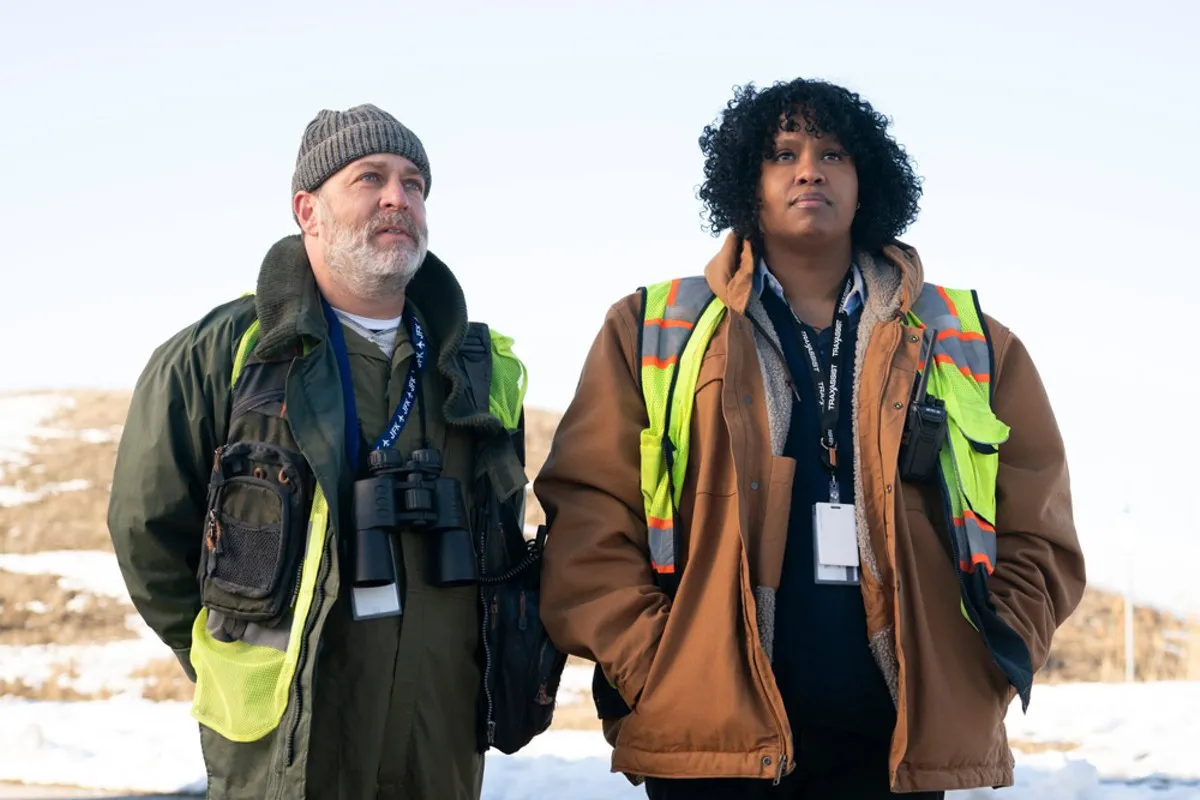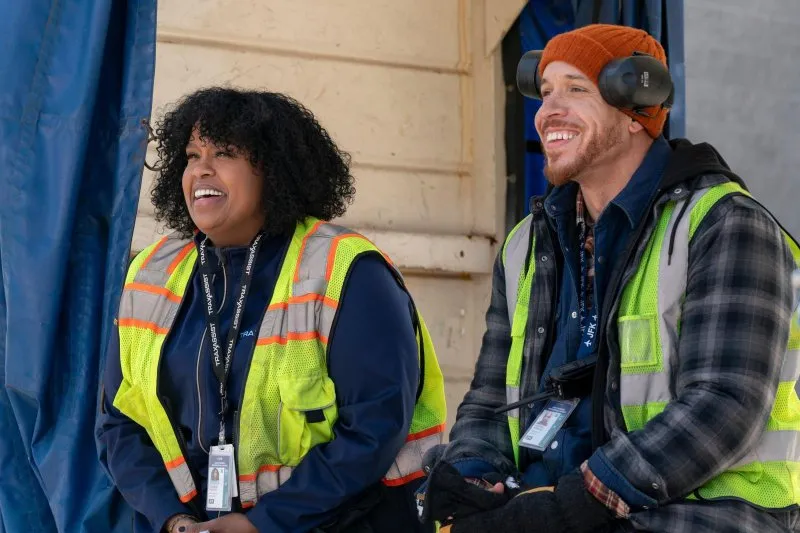Melissa is an airport employee in New York who seems to have everything together—she’s friendly, helpful, and knows her way around JFK. But beneath the surface, things aren’t so cheerful. At 35, Mel feels broke, alone, and unsure what to do with her life. On her birthday, an unusual accident gives her a new perspective.
Natasha Rothwell brilliantly brings Mel to life in the new Hulu series How to Die Alone. As the creator and star, Rothwell explores what’s really going on beneath Mel’s cheerful exterior.
A fearless sense of humor mixes with genuine emotion, inviting viewers into Mel’s journey of self-discovery. Through it all, the complex characters and colorful setting of JFK airport keep things lively.
By peeling back Mel’s layers, Rothwell reveals deeper truths about insecurity, courage, and community. For anyone who has ever felt lost and uncertain of their path, How to Die Alone offers insight, laughs, and an empowering tale of stepping outside one’s comfort zone.
Meeting Melissa
Right from the start, we get a sense of Melissa’s cheerful yet troubled spirit. She loves ferrying passengers through JFK, chatting everyone up with her bubbly personality. But hints show deeper melancholy. We learn she’s stuck in a rut—broke at 35 with a job going nowhere, isolation creeping in.
All comes to a head on her birthday. After falling out with best friend Rory, Melissa seeks escape in furniture assembly. Yet this leads to calamity, as her new armor topples, leaving her accidentally choked and crushed. In death’s embrace, she encounters a kindred soul who inspires her first steps to liberate herself from fear’s hold.
Revived with a new perspective, Melissa redoubles social efforts. At work, she clashes regularly with Patti but finds camaraderie with Terrance and airport pals. Romance also reenters her world—an ex’s wedding creeping closer, plus stirrings with another. But these pale beside her journey inward.
Melissa delves into past mistakes blocking fulfillment, like relying on Rory or staying distant from family, especially disapproving brother Brian. Difficult discussions bring catharsis, and new bonds form, like with bartender Allie. Professionally, management classes hold appeal versus the familiar.
All leads to a climactic choice: will Melissa surrender one last chance or take fate in hand? With help from inspiring figures encountered by chance, she gains wings to finally leave the nest, journeying toward the light within and without that guides freedom’s flight. More growth surely awaits this phoenix in new seasons to come.
Complex Companions
At its heart, How to Die Alone belongs to Melissa. Natasha Rothwell brings this airport assistant to life with subtle mastery. Mel wears insecurity and isolation behind spirited smiles, longing buried beneath jokes. Rothwell captures her soft strength even in the darkest moments, hinting at resilience that brings empathy more than scorn.
Mel desperately craves direction but falters walking her talk. Rothwell infuses self-doubt into stubborn self-sabotage, a cocktail potent as it feels real. Whether clashing with authority or coddling Rory, Mel shields wounds with aggression or escape, yet Rothwell’s layered performance invites understanding, not accusation.
Rory’s gentle levity offsets turbulence, Conrad Ricamora lending depth to the best friend often taken for granted. Reconciling flakiness with loyalty tests their bond, but fondness survives faults on both sides. Alex presents temptation; Mel barely lets herself envision, Jocko Sims’ charm amplifying the poignancy of roads not taken.
Then comes Terrance. Seemingly simplistic support, KeiLyn Durrel Jones imbues hidden layer upon layer. Steadfast sincerity grounds Mel without coddling, wisdom seasoning wit. Their rapport fosters unlikely intimacy, baring both souls to light long-shielded. Beneath banter, worlds of care tread lightly.
With empathy and wit, Rothwell and company craft characters as complex as the community itself—imperfect yet inseparable, always striving towards better while celebrating even flawed efforts at living fully together. How to truly love ourselves emerges in how we accept love from others, however awkwardly its expression. These portraits prove that truth is as compelling as any fiction.
Navigating Insecurity
How to Die Alone delves into heavier themes beneath laughs. Central is loneliness—how it creeps in—and courage needed to confront its roots within. Mel battles this through a journey of self-discovery.
Insecurity, its close cousin, features regularly. Rothwell explores it authentically—not to shock, but to share experiences universal yet seldom portrayed. Scenes ring true as Mel’s vulnerable moments, bringing empathy over scorn. Her flaws feel human; we recognize shards of ourselves and relations in kind.
Community plays savior. Diverse friend circles lift Mel, sharing laughter, philosophy, and support. Diversity depicts life accurately; backgrounds mix freely, as they should. Bonds form across perceived lines. Some let Mel down, yet loyalty survives faults, mirroring resilience within real connections.
Mel gradually acknowledges accountability. While circumstances shape us, responsibility lies in accepting that and changing perspectives instead of blaming outside forces. Personal growth happens this way, not through chance but through daily decisions. Meeting others by happenstance spurs her to decide to fly.
Themes flow naturally from Rothwell’s nuanced writing. She builds understanding of shared struggles. By journey’s end, Mel recognizes how fully loving herself means lifting up those who lift her in turn – and seeing light long-shielded by worries we all face at some point or another. Her flying metaphorically and literally shows freedom found within.
Setting the Stage
Rothwell leaves her brilliant mark everywhere in How to Die Alone. Playing Melissa with soulful authenticity, she invites us into doubts so relatable yet seldom addressed. As a creator, her skilled comedy balances light and dark with ease.
Talents like Ricamora and Sims bring characters to life, from Rory’s gentle friendship to Alex’s tempting past. Their ease alongside Rothwell lifts every scene. Others like Jones and McLeod make fast friends, mining humor from life’s messiness without judgment.
Airports own chaotic spirit yet foster community. How to Die Alone captures JFK’s heart, quirks entering our own with insights into an ordinary place extraordinarily complex. From luggage scavenging to bureaucratic lunacy, melded flawlessly into the plot, these glimpses invite laughs while respecting reality’s heart.
Opening interviews establish empathy. Faced with life’s biggest questions each week, real people share wisdom that grounds each episode in truth. Their candor mirrors Rothwell’s in fostering understanding over accusation, as all relationships do in their best moments.
In Rothwell’s vision, from conception to execution, artistry and message flawlessly unite. How to Die Alone spreads joy while mirroring our shared hopes of embracing life’s fuller, messier experiences alongside others, as alone yet together we all ultimately are.
Relatable Realities
How to Die Alone takes inspiration from shows known for sharp portrayals. Like Insecure and Survival of the Thickest, Rothwell’s creation explores lives feeling lost and longing for meaning.
Yet How to Die Alone strikes its own tone. Where some find humor in external targets, Rothwell delves within, crafting empathetic characters we recognize as complex versions of ourselves. Themes like uncertainty and community ring true as life’s perpetual arcs rather than temporary plot devices.
Unconstrained by traditional sitcom conventions, Rothwell’s style feels refreshingly authentic. Grounded firmly in Mel’s life, flecks of magic realism enrich perspectives instead of distracting suspension of belief.
Complexities arise more naturally too from seamless integration of social issues into characters’ everyday challenges. Representation feels welcome yet organic rather than token; diversity depicts lives as they exist, not as abstraction.
While Rothwell pays homage to other groundbreaking shows, her talents ensure How to Die Alone stands alone. Discovering shared humanity amid all our perceived differences invites living fearlessly within our truth as community strengthens each soul’s fragile flight. Real conversations feel revived through this art offering mirrors that uplift.
Taking Flight
How to Die Alone leaves its mark with humor and heart. At its core, Rothwell crafts an earnest exploration of facing life’s uncertainties. With comedy serving as a conduit, this gift gives hope in the shining light of shared experiences.
Throughout, Mel’s exploration introduces depth through raw emotion and nuanced themes. Rothwell portraying vulnerability and flaws with mastery invites deeper understanding. Areas like confronting past mistakes and embracing community ahead offer a journey just beginning.
Predictions see Mel strengthening bonds while pursuing dreams. Past mistakes teach present victories. Potential suitors leave future surprising, though Terrance’s care feeling fate. Quality writing and a talented cast ensure further adventures felt, from confrontation to connection.
Representation matters. How to Die Alone lifts all recognizing pieces of ourselves in another’s story, sharing joy of living fully just as fear holds us from taking flight. Rothwell’s fearless portrayal inspires facing life’s music however it sounds, finding solace in the shared beat of every heart that dances to its rhythm.
This gem deserves wide audience for spreading empathy. Its brilliance springs from shining light into life’s shadowy corners, seeing past surface into experiences drawing us together beyond perceived lines. How to Die Alone gifts flight for all souls ready to soar.
The Review
How to Die Alone
How to Die Alone soars with humor and humanity. Natasha Rothwell's nuanced writing and soulful performance bring an insightful perspective to themes of insecurity, community, and personal growth. With colorful characters and an authentic portrayal of life at JFK Airport, this dramedy deftly balances laughs with poignancy. How to Die Alone feels refreshingly authentic in its messy celebration of living fully. Rothwell creates a memorable protagonist in Melissa, and I look forward to following her further self-discovery in hopeful future seasons.
PROS
- Natasha Rothwell's nuanced and compelling lead performance
- Authentic exploration of universal themes like insecurity and personal growth
- Flawed yet relatable characters portrayed with empathy
- Witty and heartfelt writing balances humor and emotion.
- Rich setting of JFK Airport enhances character development and comedy.
- Diverse and talented supporting cast with great chemistry
CONS
- Early episodes take time finding a consistent tone.
- Mel's reluctance to change makes her difficult to root for initially.
- Weekly release format interrupts binge-worthy watching experience





















































